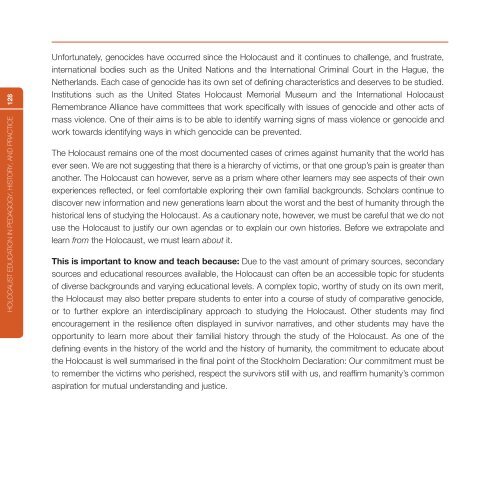2kNreeJ
2kNreeJ
2kNreeJ
You also want an ePaper? Increase the reach of your titles
YUMPU automatically turns print PDFs into web optimized ePapers that Google loves.
HOLOCAUST EDUCATION IN PEDAGOGY, HISTORY, AND PRACTICE 128<br />
Unfortunately, genocides have occurred since the Holocaust and it continues to challenge, and frustrate,<br />
international bodies such as the United Nations and the International Criminal Court in the Hague, the<br />
Netherlands. Each case of genocide has its own set of defining characteristics and deserves to be studied.<br />
Institutions such as the United States Holocaust Memorial Museum and the International Holocaust<br />
Remembrance Alliance have committees that work specifically with issues of genocide and other acts of<br />
mass violence. One of their aims is to be able to identify warning signs of mass violence or genocide and<br />
work towards identifying ways in which genocide can be prevented.<br />
The Holocaust remains one of the most documented cases of crimes against humanity that the world has<br />
ever seen. We are not suggesting that there is a hierarchy of victims, or that one group’s pain is greater than<br />
another. The Holocaust can however, serve as a prism where other learners may see aspects of their own<br />
experiences reflected, or feel comfortable exploring their own familial backgrounds. Scholars continue to<br />
discover new information and new generations learn about the worst and the best of humanity through the<br />
historical lens of studying the Holocaust. As a cautionary note, however, we must be careful that we do not<br />
use the Holocaust to justify our own agendas or to explain our own histories. Before we extrapolate and<br />
learn from the Holocaust, we must learn about it.<br />
This is important to know and teach because: Due to the vast amount of primary sources, secondary<br />
sources and educational resources available, the Holocaust can often be an accessible topic for students<br />
of diverse backgrounds and varying educational levels. A complex topic, worthy of study on its own merit,<br />
the Holocaust may also better prepare students to enter into a course of study of comparative genocide,<br />
or to further explore an interdisciplinary approach to studying the Holocaust. Other students may find<br />
encouragement in the resilience often displayed in survivor narratives, and other students may have the<br />
opportunity to learn more about their familial history through the study of the Holocaust. As one of the<br />
defining events in the history of the world and the history of humanity, the commitment to educate about<br />
the Holocaust is well summarised in the final point of the Stockholm Declaration: Our commitment must be<br />
to remember the victims who perished, respect the survivors still with us, and reaffirm humanity’s common<br />
aspiration for mutual understanding and justice.


